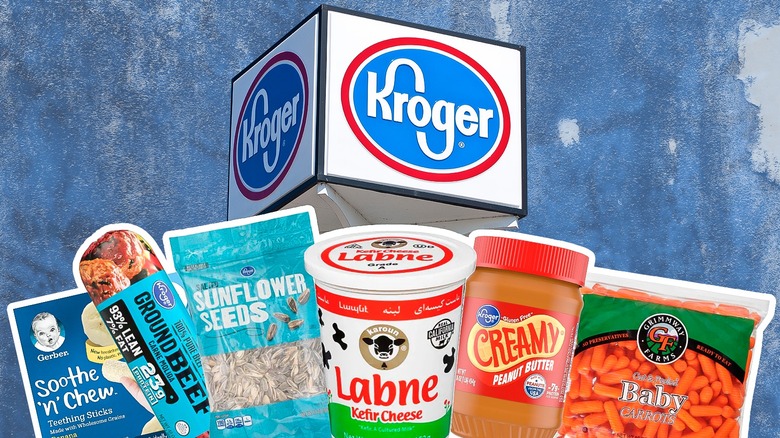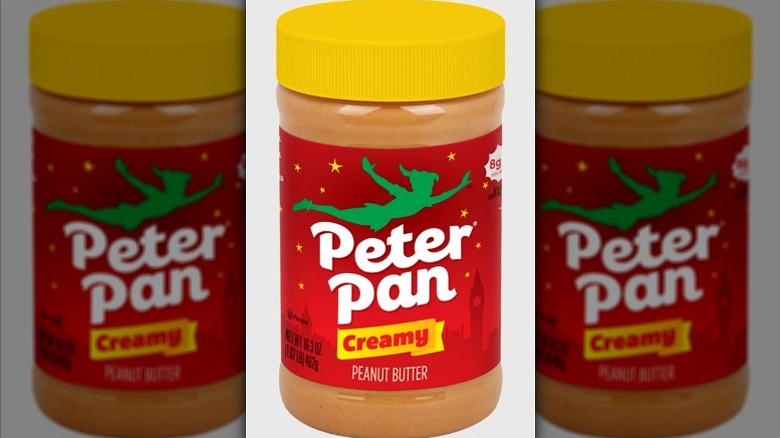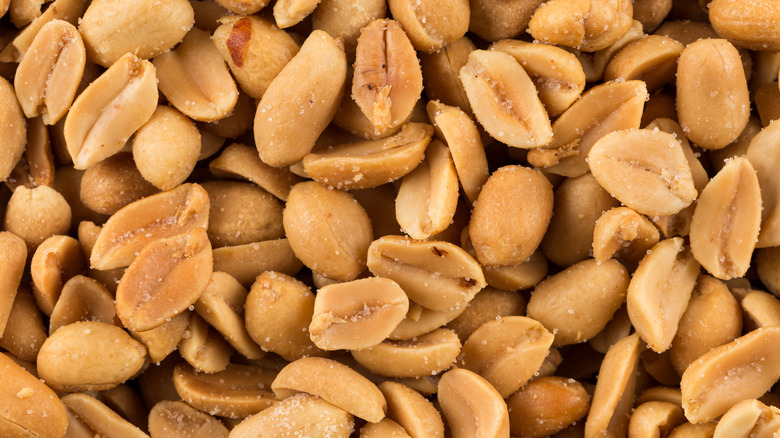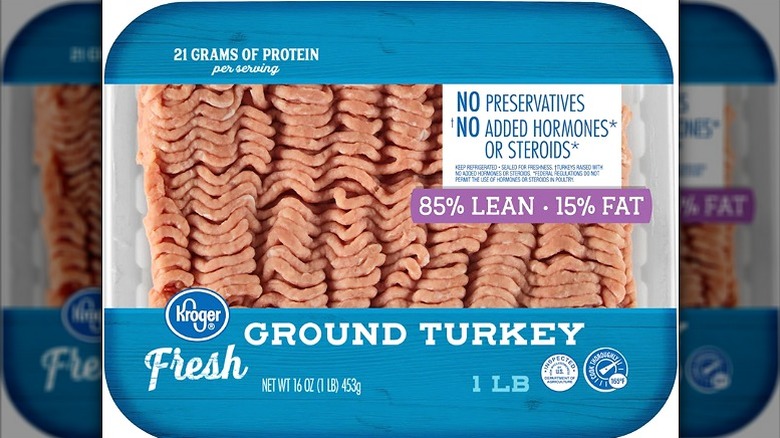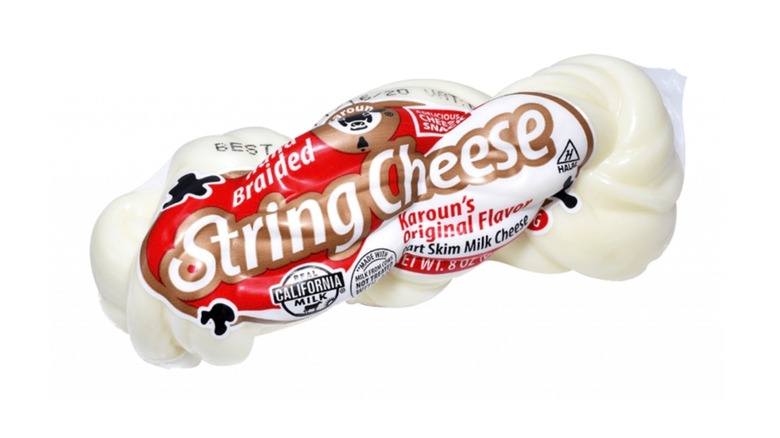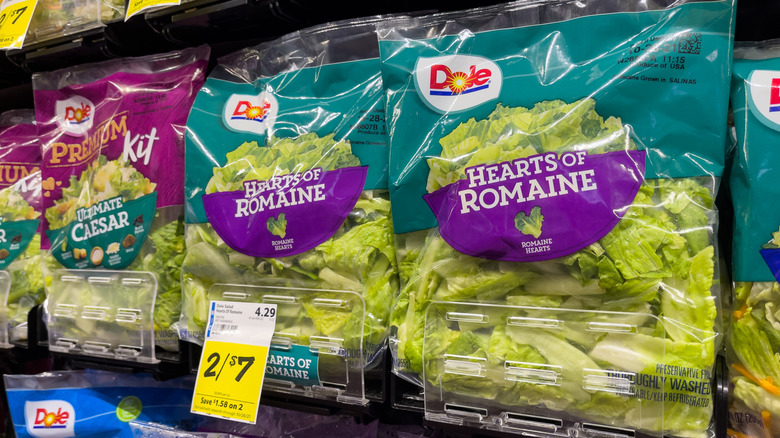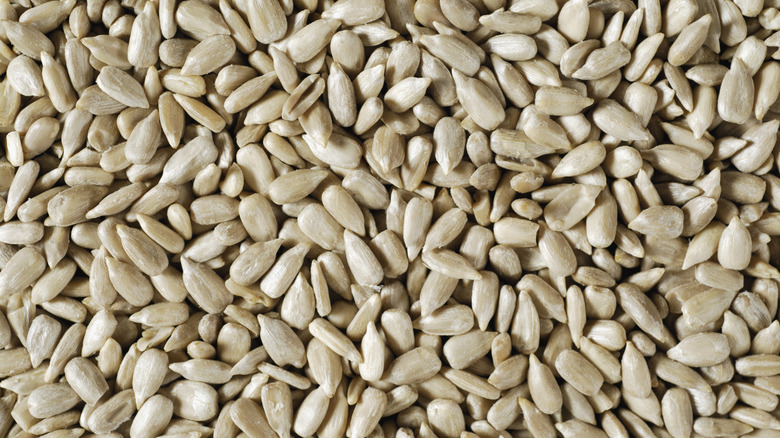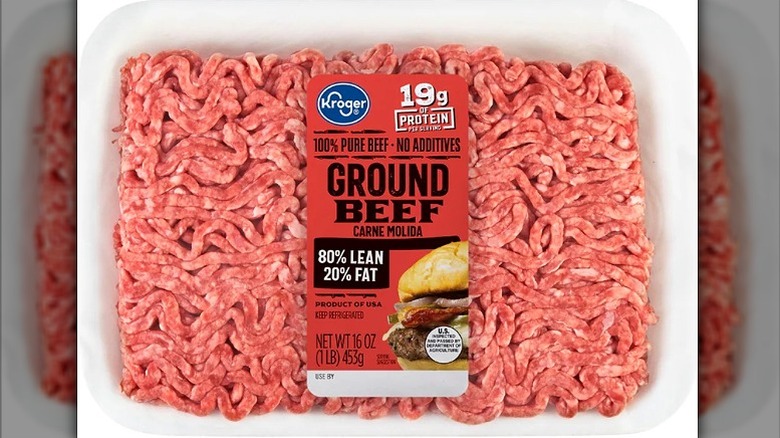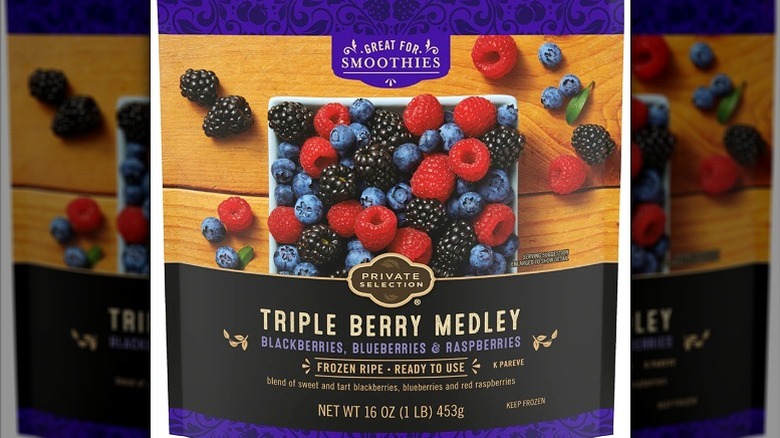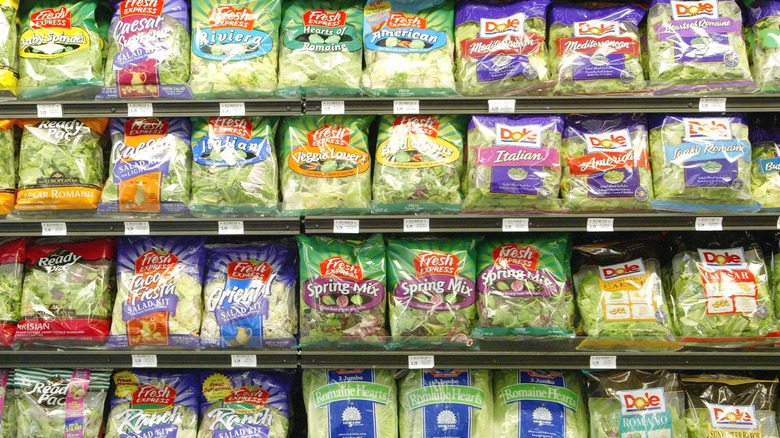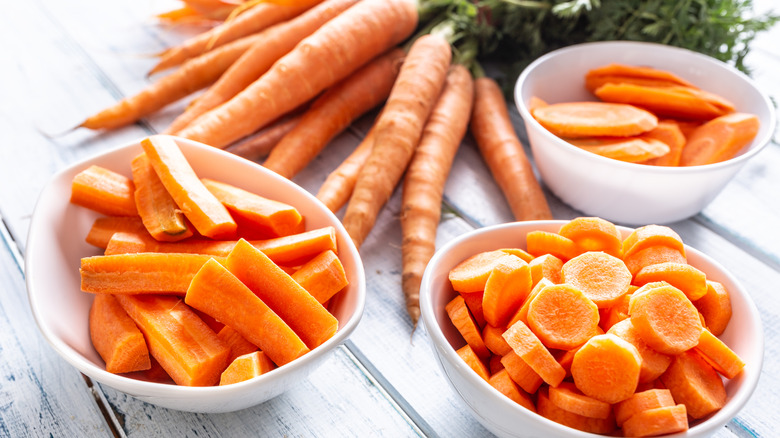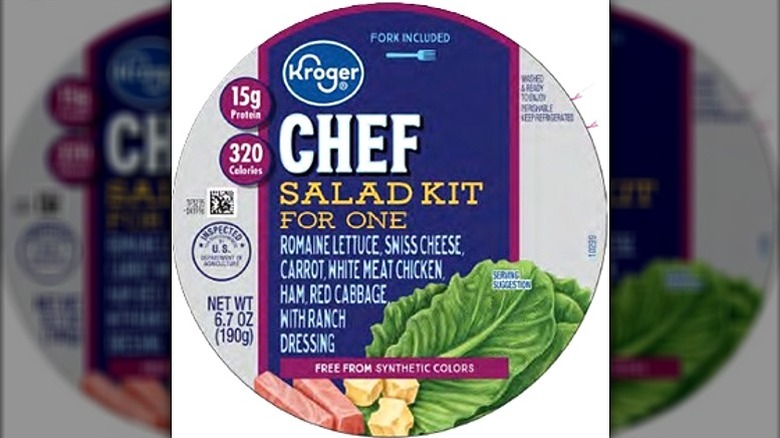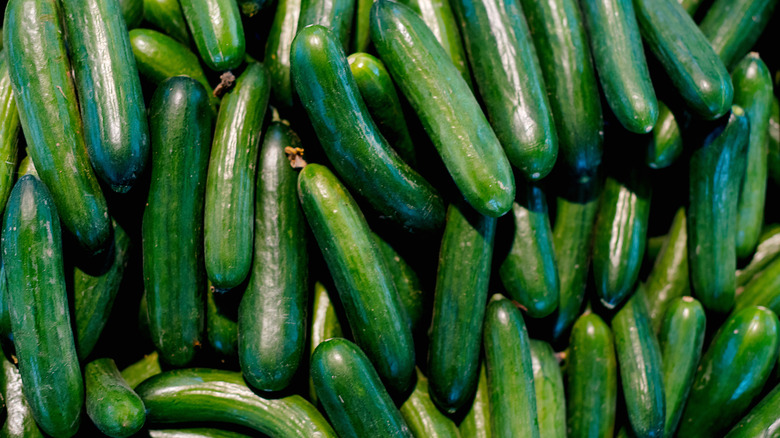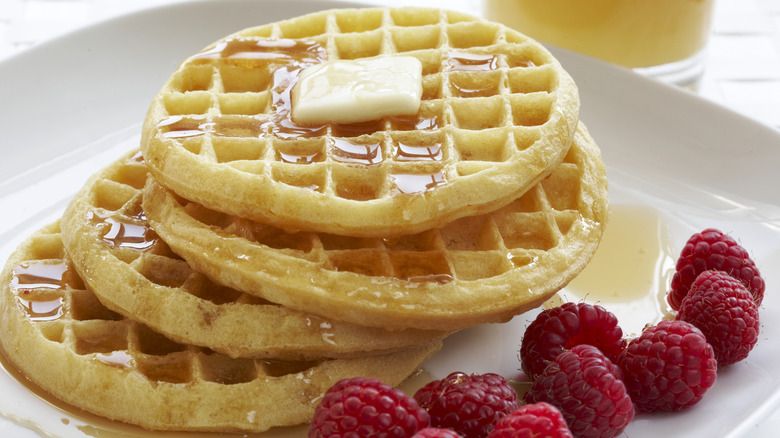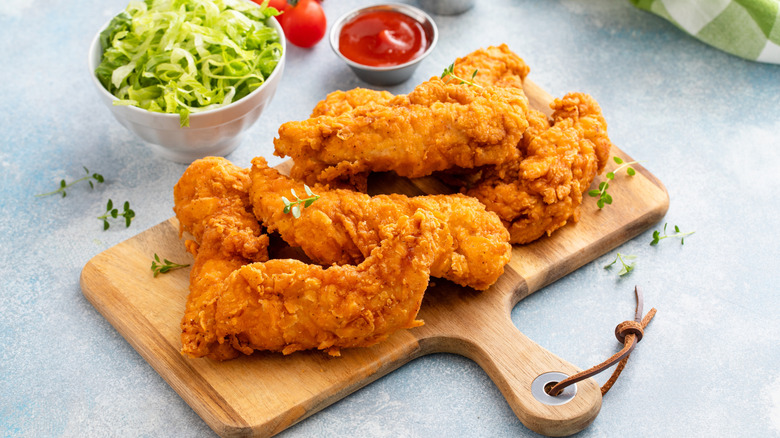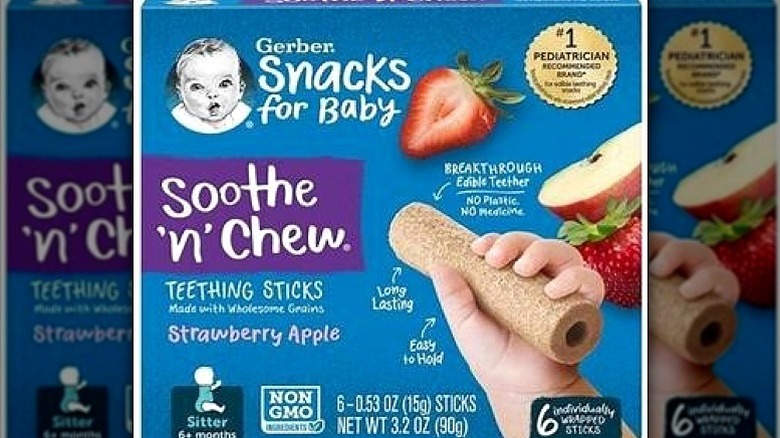These Are Kroger's Biggest Food Recalls In History
Most major supermarkets have dealt with a food recall or two at some point — sometimes a whole slew of them — and Kroger is no exception. Some of the biggest food recalls in Kroger's history overlap with those of other major retailers due to the sheer scale of food corporations and their vast distribution reach. As one of the largest supermarket chains in the U.S., Kroger stays competitive with its private label brands. Yet even those brands are not immune from sloppy practices at suppliers' facilities where faulty equipment or packaging can lead to bacterial contamination, resulting in a rise of foodborne illness.
Bacteria like salmonella, listeria, and E. coli can cause multiple symptoms ranging from mild to severe, typically presenting with gastrointestinal distress. In vulnerable groups, such as the very young, elderly, and those with compromised immune systems, symptoms of foodborne illness can escalate, requiring medical attention. From one of the costliest food recalls in history to one of the largest by volume, several Kroger recalls have been linked to hundreds of illnesses and multiple deaths.
ConAgra Peter Pan Peanut Butter (2006—2007)
In one of the worst food recalls in U.S. history, Peter Pan Peanut Butter was part of an enormous and costly recall from ConAgra Foods Inc. in 2006-2007. At the time, Kroger carried Peter Pan peanut butter. The problem surfaced when a large number of salmonella illnesses caught the attention of authorities, sparking an investigation to determine the source of the bacteria. The outbreak was traced back to jars of peanut butter from both Walmart's Great Value brand and the Peter Pan brand. Testing jars at the plant as well as opened jars from consumers confirmed salmonella contamination. More than 700 people were affected, though authorities suspected the real number was likely in the thousands.
Officials blamed poor practices at the ConAgra plant, citing broken sprinkler heads and a leaky roof that allowed excess moisture to support bacterial growth on raw peanuts during production. If that wasn't bad enough, it came out that ConAgra knew about its faulty processing plant and knowingly shipped potentially contaminated jars of peanut butter across the nation — though they claimed otherwise. ConAgra was hauled into court, pleaded guilty under a plea agreement admitting complicity, and paid one of the largest fines in a food safety case: $11.2 million. The company also shelled out another $275 million to upgrade its facilities. After doing its due diligence, Peter Pan peanut butter is now safe to eat.
Peanut products (2008—2009)
Kroger faced yet another high-profile peanut recall right on the heels of the previously mentioned ConAgra peanut blunder. While the supermarket chain wasn't directly involved, the massive recall from the Peanut Corporation of America (PCA) resulted in multiple deaths, arrests, and imprisonments. Kroger recalled a slew of peanut butter products, including assorted bakery cookies, Private Selection Peanut Chocolate Chunk Cookies and Variety Cookie Trays, and Private Selection layer iced cakes.
In 2008, the CDC detected an identical salmonella strain in a group of 13 people across 12 states, which led to its discovery of a 46-state outbreak of salmonella infections. An investigation by the Minnesota Department of Health pinpointed King Nut's creamy peanut butter as the likely source. King Nut, produced by the PCA, had been distributed nationwide, and nearly 3,000 peanut-containing products, including pet products, had to be recalled.
More than 700 people were infected with salmonella, a quarter of whom were hospitalized, and nine died. The PCA shut down after the outbreak, and the company went bankrupt. The FDA found that the PCA knowingly distributed contaminated product, using false certificates of analysis multiple times. As one of the biggest — and costliest — food recalls in history, PCA owner and president Stewart Parnell was found guilty on 67 felony counts, including conspiracy, fraud, and sale of adulterated food. He was sentenced to 28 years in prison followed by supervised parole. The judge held Parnell accountable for $100 to $200 million in losses and harming more than 250 people.
Cargill ground turkey (2011)
In one of the biggest food recalls in Kroger's history, Cargill Meat Solutions Corporation recalled 36 million pounds of ground turkey in 2011 under suspicion of salmonella contamination. Kroger sold this ground turkey under its own brand label in 1- and 3-pound trays of fresh ground turkey, as well as 1-pound trays of turkey patties. In total, there was one death, and more than 135 reported illnesses and 35 hospitalizations across 34 states. That particular strain of salmonella was highly resistant to treatment.
Multiple samples of ground turkey from various retail locations tested positive for a multi-drug-resistant strain of salmonella. In time, investigators collected enough information for Cargill to shut down production, and the company recalled another 185,000 pounds of ground turkey. The entire fiasco of this Class I food recall cost Cargill millions of dollars per week, which led to a company-wide layoff of employees.
Karoun Dairies cheeses (2015)
In 2015, Karoun Dairies issued a voluntary recall of 15 different soft cheeses, including feta and string cheeses. After a number of illnesses with the same rare listeria fingerprint cropped up across the nation, an investigation was initiated to find the source of the multi-state outbreak. Those who fell ill reported eating a brand of cheese distributed by Karoun Dairies, and the results of the investigation determined its soft cheeses were the culprit. The brands involved included Karoun, Arz, Gopi, Queso Del Valle, Central Valley Creamery, and Yanni, which were sold at various retailers across multiple states.
Kroger was among the stores forced to issue a recall due to Karoun Dairies' cheeses. The soft cheese in question came sealed in vacuum packs, jars, or pails. Karoun Dairies halted production of the affected cheeses until the recall was complete and the issue resolved. In total, there were 30 reported illnesses, 28 of which resulted in hospitalizations, across 10 states. The outbreak was linked to three deaths and one fetal death tied to the mother's illness.
Dole salad greens (2016)
Kroger faced one of the biggest food recalls in history in 2016, a mess that impacted other major retailers like Walmart and Meijer. Numerous salad green brands and varieties were flagged for possible contamination from a Dole facility in Ohio after a multi-state listeria outbreak led investigators to the Dole processing plant. Kroger pulled bagged lettuce, cole slaw mix, salad greens, kale, and spinach — under brands like Dole and its private labels, Fresh Selection and Simple Truth — from store shelves in 23 states and parts of Canada. Kroger's private brands were packaged at the same Dole facility.
This nationwide listeria outbreak resulted in 19 illnesses and hospitalizations across nine states and was linked to the death of one woman. Another woman slipped into a coma for over a month after eating listeria-contaminated Dole salad. She woke up paralyzed, and her family sued the company. The civil case was settled in 2017, but her current health status remains unknown.
Sunflower seeds (2016)
In 2016, SunOpta voluntarily recalled sunflower kernel products that were produced at its Minnesota facility due to potential listeria contamination. SunOpta, a supplier for various brands and retailers across 28 states, received a customer complaint about the issue. No illnesses were reported, but the company didn't take any chances — it quickly isolated which products might be affected and pulled them from circulation.
As part of that recall, Kroger removed Sunflower Salad Toppers, Sunflower Kernels, Cranberry Delight Trail Mix, Broccoli Raisin Salads, Deli Broccoli Cranberry Salads, and Deli Superfood Salads from its shelves, all under its private label. Other stores caught up in the recall included City Market, Smith's, Dillons, and Bakers, to name a few. SunOpta took the necessary corrective actions to prevent further listeria exposure, resumed its operations, and increased testing activity of outgoing shipments.
Kroger raw ground beef (2018)
In 2018, an outbreak of a multi-drug-resistant salmonella strain, Newport, swept across 26 states, sickening a total of 246 people. This outbreak triggered a massive raw beef recall that hit packages of ground beef sold at Kroger stores nationwide. More than 12 million pounds of raw beef were yanked from circulation by the meat supplier, Arizona-based JBS Tolleson, Inc. The raw beef was flagged as a Class I risk for serious foodborne illness: in this case, salmonella. During the outbreak investigation, authorities expanded the recall product list to include an additional nearly 5.2 million pounds of raw beef.
Health officials with the USDA urged anyone with JBS Tolleson raw beef products to toss them out or return them to Kroger stores for a full refund. Overall, the company recovered just under 167,000 pounds of raw beef. Authorities encouraged consumers to check their freezers to ensure the safety of their stored food.
Townsend Farms frozen fruit (2019)
Townsend Farms is no stranger to recalls. In 2019 during regular laboratory testing, Townsend Farms' frozen berries were confirmed to be positive for hepatitis A. A handful of years prior in 2013, this company was linked to a multi-state hepatitis A outbreak that also involved frozen fruit — this outbreak sickened 162 people and 71 hospitalizations were reported. No illnesses were ever reported in connection with the 2019 recall, though hepatitis A has a long incubation period, and individuals may have become sick months later. The frozen fruit products had a two-year shelf life and customers were urged to check their freezers.
Due to the confirmed hepatitis A test, Kroger pulled its Private Selection of triple berry medley and blackberries from its freezer sections in all of its stores nationwide. Other stores affected by this frozen fruit recall included Smith's, City Market, Pick 'n Save, Dillons, and many more.
Dole/Fresh Express salad products (2021)
One of the biggest food recalls in Aldi's history is also one for Kroger's record books. In 2021, Fresh Express and Dole recalled bags of salad greens and related products amid a listeria scare. The multi-state outbreak sickened roughly 30 people and resulted in about two dozen hospitalizations and four deaths. It was linked to both Fresh Express and Dole salad products. Investigation into the outbreak, paired with random sample testing at Fresh Express' Illinois facility and Dole's plants in Arizona, Ohio, and California, discovered the presence of listeria lurking on harvesting and processing equipment. The salad products were sold in 19 states and distributed to various retailers under multiple brands.
Kroger pulled an array of its own label's salad products from its shelves, such as kale Caesar, baby spinach, lettuce mixes, salad green mix, and coleslaw, in addition to Dole and Fresh Express products. Some other brands affected included Little Salad Bar and Simply Nature. Other major retailers caught up in the salad and listeria outbreak included Target, Walmart, Lidl, and BJ's. The faulty equipment was decommissioned and dismantled, and operations stalled until the facilities were treated, tested, and given a pass to resume production.
Grimmway Farms carrots (2024)
The FDA and CDC investigated an outbreak of E. coli infections across multiple states, tracing the illnesses to organic whole and baby carrots supplied by Grimmway Farms in California. There were a total of 48 illnesses across 19 states, resulting in 20 hospitalizations and one death. In response, Grimmway Farms recalled a variety of select carrot products classified as a high-risk Class I food hazard. The contaminated carrots had been shipped to various retailers across the nation, plus Puerto Rico, Canada, and other international markets.
Major chains like Kroger, Trader Joe's, Whole Foods, and Wegmans were impacted by the extensive Grimmway recall, which included brands like 365, Good & Gather, GreenWise, Nature's Promise, Bunny Luv, and Kroger's private label. Kroger carried various weights and multiple brands of bagged organic whole carrots, whole carrots, baby cut carrots, and peeled carrots.
BrucePac ready-to-eat poultry (2024)
In 2024, another massive food recall swept across multiple states, hitting major retailers, restaurants, public institutions, and community facilities, involving a range of brands. Oklahoma-based company BrucePac recalled nearly 12 million pounds of ready-to-eat meat products due to potential listeria concerns. Routine product testing showed positive results for the foodborne illness. It was determined that BrucePac's ready-to-eat chicken was the source of the issue, prompting the company to halt production and address the problem. No illnesses were ever confirmed in connection with this recall.
The widespread poultry problem affected big-name stores like Kroger, Trader Joe's, Publix, Costco, and Aldi, along with hundreds of schools from pre-K to college. Kroger pulled an array of products from its shelves as a result of BrucePac's listeria concerns, including ready-to-eat chicken products like Kroger salad kits, Red's burritos, El Monterey enchiladas, Evol bowls, Home Chef tacos, and an assortment of branded frozen meals.
Cucumbers (2024)
In 2024, the FDA and CDC looked into a salmonella outbreak that took place in multiple states. The salmonella strain was linked to cucumber products grown in Mexico. The outbreak sickened 113 people across 23 states, resulting in 28 hospitalizations. No deaths occurred. As a result of the outbreak, SunFed recalled various sizes of whole, fresh cucumbers that were distributed to food service and retail outlets nationwide. Cucumbers were sold in bulk to major retailers like Kroger, Costco, Sprouts, Sam's Club, and Walmart, but also shipped to third-party product suppliers for use in salad kits, veggie bowls, sushi rolls, and party trays under various brand names.
Kroger pulled a wide variety of products from its shelves, including sushi rolls, combos, platters, poke bowls, and chef specials. In addition to those products, Kroger had to recall vegetable trays, salad mixes, snack cups, and seasoned cucumber slices. Cucumbers are a versatile vegetable that can be used in a number of refreshing recipes, so it's not surprising that this food recall impacted such a wide variety of products — personally, we're glad it's been dealt with.
Assorted waffles and pancakes (2024)
TreeHouse Foods, Inc. recalled frozen waffle products in connection with listeria concerns in 2024. The potentially affected products were distributed throughout the U.S. and Canada to a swath of major retail chains, under private labels and various brands. The issue was discovered during routine testing. Nearly every supermarket giant was impacted, including heavy hitters like Aldi, Dollar General, Publix, Target, HEB, Kroger, Trader Joe's, Wegmans, and Walmart. Some of the brands affected included 365, Best Choice, Food Lion, Giant Eagle, Good & Gather, Great Value, Nature's Promise, and Wild Harvest.
TreeHouse quickly expanded its recall to include frozen toaster waffles, Belgian waffles, and various pancake products under multiple brands. The wide range of frozen foods included every variety from blueberry to flax to chocolate chip. Kroger pulled its original and buttermilk pancakes, along with Kodiak and Simple Truth vanilla, chocolate, blueberry, and buttermilk pancakes and waffles. There were no reports of illness linked to this frozen food recall.
Perdue frozen chicken breast tenders (2024)
Perdue Foods LLC recalled frozen, ready-to-eat chicken breast nuggets and tenders in 2024 due to the possibility of the products containing foreign material. Customer complaints alerted authorities to the possibility of metal wire embedded in chicken tenders, and foreign material was indeed identified in a number of consumer packages. Potentially affected items were distributed to major retailers nationwide, as well as sold online. After investigation, the company stated it was a thin strand of metal wire that inadvertently got into the production process. Perdue recalled just over 167,000 pounds of chicken as a result.
In response to this giant chicken recall, Kroger pulled its Perdue packages from the freezer section, which included frozen breast tenders and Simply Smart chicken tenders. There were no confirmed reports of injury or further issues associated with this recall. If news of this recall has you a little shaken up, consider making some classic chicken tenders at home in lieu of frozen varieties.
Gerber Soothe 'N' Chew Teething Sticks (2025)
In 2025, Gerber Products Company announced a recall of teething sticks for babies and toddlers due to them being a choking hazard. The company also made the decision to discontinue all batches of Gerber Sooth 'N' Chew Teething Sticks going forward, which came in strawberry apple and banana flavors. These items were shipped nationwide to various distribution centers and retail stores, as well as being sold online. The wide scope of the recall stretched to 45 states and Puerto Rico. The company was alerted to the potential problem when customers complained about choking incidents.
As a result of this recall, Kroger removed Gerber's teething sticks in both banana and strawberry apple flavors. The teething sticks had been distributed to Kroger stores across multiple regions, and customers were urged to get rid of the sticks immediately or return them to the store for a full refund.
